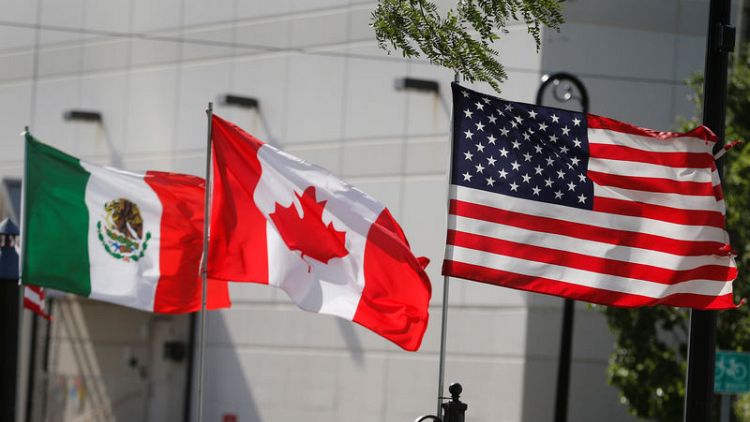By Andrea Shalal
WASHINGTON (Reuters) - International tariffs are putting the brakes on business expansion, posing a bigger hurdle than tax barriers, the cost of transporting goods or compliance with local rules, according to a survey of 1,500 U.S., Mexican and Canadian business leaders.
Fifty-three percent of those polled by TMF Group, an Amsterdam-based professional services firm, saw tariffs as the biggest factor hindering business expansion.
Forty-seven percent of U.S. business leaders said Mexico would be the most important trading partner for U.S. companies over the next five years, compared to just 29% who saw China in that role, the survey showed.
Mexican business leaders, by contrast, were more bullish on China, with 64% listing it as their main trading partner in the next five years, just ahead of the United States with 63%. No comparison figures were available since the survey was not conducted last year.
Mark Weil, chief executive officer of TMF Group, said the survey clearly reflected heightened concerns about the U.S.-China trade war, now in its second year, with depressed business sentiment and uncertainty weighing on investment decisions.
But he said it was too soon to forecast a lasting decoupling of the U.S. and Chinese economies, the two largest in the world.
"There's quite a lot of noise around it, but is it long-lasting?" he told Reuters. "It's driven by policy decisions that can be changed."
The International Monetary Fund forecasts that tariffs already imposed or planned by the United States and China will shave 0.8% off global economic output in 2020.
NORTH AMERICAN TRADE DEAL
Nearly 70% of the business leaders surveyed expect a new U.S.-Mexico-Canada (USMCA) trade agreement to be ratified by all three countries, with that number jumping to 88% in Mexico - the sole country whose legislature has ratified thus far.
The countries signed the agreement last year, but it must be ratified by the legislatures of all three to take effect.
Fifty-seven percent of the business leaders surveyed expect USMCA to have a positive economic effect on their countries, and 61% expected more foreign companies to invest in their markets if the deal is quickly ratified, the TMF survey showed.
Weil said North America was one of the biggest free trade areas in the world, and ratification of USMCA would have huge ramifications for all three countries and the world as a whole.
But he warned against complacency.
"The key is not to sit and passively watch the political process unfold," Weil said. "Even with a deal, firms wishing to export or invest will face complexities, so it is wise to begin contingency planning now for both scenarios: ratification and failure."
(Reporting by Andrea Shalal; Editing by Tom Brown)



